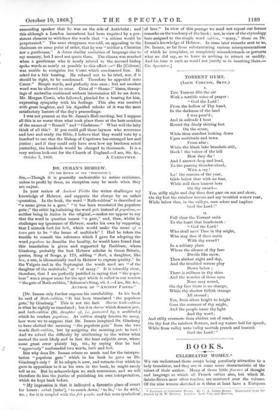DR. INMAN'S HEBREW.
[TO TUE EDITOR OF TIIE "SPECTATOR:']
SIR,—Though it is generally undesirable to notice criticisms, unless to profit by them, an exception may be made when they are unjust.
In your review of Ancient Faiths the writer challenges ray knowledge of Hebrew, and supports the charge by an unfair 'quotation. In the book, the word " Bath-rabbim" is described as "a name given to a gate," "it has been translated the populous gate ;" the critic by: italicizing the word gate instead of populous, — neither being in italics in the original,—makes me appear to say that the word in question means "a gate," and, then, whilst he challenges my ignorance of Hebrew, marks his own by supposing that I mistook bath for beth, which would make the name of a town gate to be "the house of multitude" Had he taken the trouble to consult the reference which I gave for adopting the word populous to describe the locality, he would have found that this translation is given and supported by Rashbarn, whom Ginsburg, probably the best Hebrew scholar in Great Britain, quotes, Song of Songs, p. 179, adding "Bath, a daughter, like ben, a son, is idiomatically used in Hebrew to express quality." In the Vulgate and in the Septuagint the words used are "of the daughter of the multitude," or "of many." It is tolerably clear, therefore, that I am perfectly justified in saying that "the popu- lous" was a proper name for the spot which is called in our version " the gate of Bath-rabbim," Solomon's Song, vii. 4.—I am, Sir, &c., AUTHOR OF " ANcrENT FAITHS."
[Dr. Inman only further exposes his unreliability. In his book he said of Bath-rabbim, "It has been translated 'the populous gate,' by Ginsburg." This is not the fact. Sha,ar bath-rabbim is what he rightly so translated ; but it is sha,ar which denotes gate, and bath-rabbim (lit, daughter of; i.e. possessed by, a multitude) which he renders populous. As rabbit,: simply denotes the many, how were we to suppose that Dr. Inman imagined Dr. Ginsburg to have elicited the meaning "the populous gate" from the two words Bath-rabbim, but by assigning the meaning gate to bath? And we solved the difficulty by attributing to the writer what seemed the most likely and in fact the least culpable error, where some great error plainly lay, viz., by saying that he had "apparently" confounded two words, bath and beth.
But why does Dr. Inman evince so much zeal for the interpre- tation "populous gate" which in his book he gave as Dr. Ginsburg's only ? If he adopts it now, and retracts that which he gave in opposition to it as his own in the book, he might surely tell us so. But he acknowledges no such conversion, and we will therefore do him the justice of publishing his own interpretation, which we kept back before.
"My impression is that it indicated a favourite place of resort for lovers: rabah [rabal, 'to couch down,' 'to lie,' 'to lie with,' &c. ; for it is coupled with the fish ponds, and fish were symbolical of love." In view of this passage we need not repeat our former remarks on the tendency of the book ; nor, in view of the etymology here assigned to the simple word rabbim, "many," those on Dr. Inman's knowledge of Hebrew. In some later remarks sent to us, Dr. Inman, so far from substantiating various misrepresentations of which he complains, so completely misunderstands or perverts what we did say, as to leave us nothing to retract or modify. And his tone is such as would not justify us in inserting'them.— ED. Specta tor.]


































 Previous page
Previous page